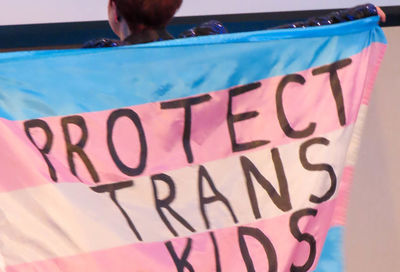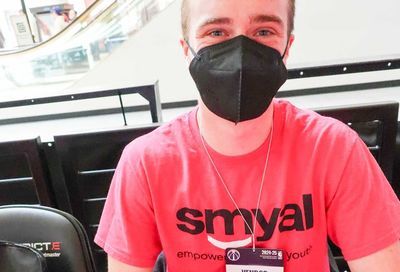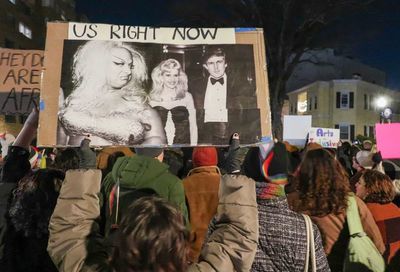Visiting Hours
A constant, claustrophobic and anxiety-inducing press of a show, 'The Road to Mecca' is a journey well-worth taking
In David Mamet’s play Squirrels, the character Arthur describes the act of storytelling as going ”From nothing to nothing…. ‘Nothing.’ Rising action. Climax. Falling action. ‘Nothing.’ We always clean up when we’re done.”
The irony being that Mamet is one of those playwrights with whom you never start out at nothing. Audience is dropped into the middle of things. The characters assembled lived and breathed and cheated and drank and swore and fought and hated one another well before you arrived on the scene. It’s not that they will hit the ground running. They have already done so and are sprinting toward that falling action Arthur falsely assumes will always come. This means that the audience’s first job is to simply catch up.

The Road to Mecca
(Photo by Carol Pratt)
The playwright Athol Fugard is another in this mold. Not only has the world you are about to enter been spinning for quite some time, you are entering after the domino effect of events has already begun to tumble. There will be no rest, no opportunity to sit and reflect. At least, that is, until the first intermission.
Make no mistake that audiences will be quite grateful for that chance to catch their breath at Studio Theatre’s production of Fugard’s The Road to Mecca. A play whose roots curl firmly around the real-life story of an outsider artist, Mecca is a constant, claustrophobic and anxiety-inducing press of a show. Think not of a steadily climbing note played on the near-breaking string of a violin, but instead of the thick, chest-rattling din of an orchestral bass drum.
The audience arrives as Helen (Tana Hicken) is rushing about her small house in New Bethesda — a village in South Africa’s Karoo — attempting to prepare for a guest. Helen is an artist who has transformed her home and its yards into a constantly evolving installation piece and sculpture gardens. Our opening introduction is to an older woman who is frantic, ill-kempt and on-the-edge.
Helen’s visitor is the young, brash Elsa (Holly Twyford), a progressive-minded schoolteacher from the city of Capetown. The unknown purpose of Elsa’s one-night visit rests as a palpable tension that festers, coloring every scene, every action and every conversation.
This is not entirely surprising as this play is set in South Africa in the early 1970s when the legal segregation of apartheid was still part of everyday life, as was still the case when Mecca premiered in the 1980s. Mecca digs deeply into layers of discrimination and judgment — not just of race and age but of the equally dangerous threat of blind liberalism. Our problems, in other words, must be respected for their complexity and far reaching impact. Everything is shaded and affected. It’s not always so easy to clean up when we’re done.
Director Joy Zinoman has assembled a fiercely talented cast who find their characters but not a consistent balance on stage. Emotions jump back and forth between extremes and the lack of modulation buries some of the play’s grace notes. The audience drowns as the deluge swallows up the beach.
To 10/12
Studio Theatre
1501 14th St. NW
$34-$61
202-332-3300
www.studiotheatre.org
Martin Rayner, who plays Pastor Byleveld, deals with this dangerous volley most cleanly. His investment in giving humanity to the character most openly at-risk for caricature yields wonderful results.
Hicken and Twyford have a chemistry that is electric when it is working and raises questions when it is not. There are moments in Mecca where the Helen and Elsa’s anger with one another smothers the tenuous knot of friendship throwing the reality of their relationship into question. It’s an admittedly difficult balance to achieve (and one that is sometimes lost in real life) but it is jarring to the show when it fails.
The Road to Mecca is a difficult, weighty and burdensome piece of theater. But it’s a trip that, despite the occasional stumble, Studio is walking quite surely.
Support Metro Weekly’s Journalism
These are challenging times for news organizations. And yet it’s crucial we stay active and provide vital resources and information to both our local readers and the world. So won’t you please take a moment and consider supporting Metro Weekly with a membership? For as little as $5 a month, you can help ensure Metro Weekly magazine and MetroWeekly.com remain free, viable resources as we provide the best, most diverse, culturally-resonant LGBTQ coverage in both the D.C. region and around the world. Memberships come with exclusive perks and discounts, your own personal digital delivery of each week’s magazine (and an archive), access to our Member's Lounge when it launches this fall, and exclusive members-only items like Metro Weekly Membership Mugs and Tote Bags! Check out all our membership levels here and please join us today!





















